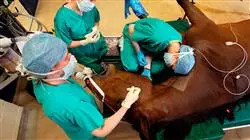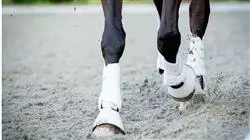University certificate
The world's largest faculty of veterinary medicine”
Introduction to the Program
This training is the best option you can find to specialize in and make more accurate diagnoses”

Veterinarians face new challenges every day in treating their patients. The Postgraduate diploma in Arthroscopy, Wounds and Developmental Diseases in Large Animals Ruminants, Camelids, Swine and Equidae : Ruminants, Camelids, Swine and Equidae comprises a complete and up-to-date educational program including the latest advances in Traumatology and Orthopedic Surgery in Large Animals.
The theoretical and practical content has been chosen taking into account its potential practical application in daily clinical practice. Furthermore, the audiovisual material collects scientific and practical information on the essential disciplines for professional practice.
In each topic, practical cases presented by experts in Traumatology and Orthopedic Surgery in Large Animals have been developed, with the objective of the practical application of the knowledge acquired. In addition, students will participate in a self-evaluation process to improve their learning and knowledge during their practical activities.
The teaching team has programmed a careful selection of techniques used in the diagnosis and treatment of Lameness in Ruminants (Cattle, Sheep), Camelids (Camels, Alpacas, Llamas), Swine (Pigs, Boars) and Equidae (Horses, Donkeys and Mules), including the description of musculoskeletal surgery and rehabilitation in those species to which they are applied.
The teaching surgeons of this Postgraduate diploma are Graduates of the European or American College of Veterinary Surgeons and have extensive experience both in the university field and in private practice. In both areas, they are responsible for large animal surgery services in leading veterinary centers and most of them direct residency programs, master's degree programs and research projects.
As a result of the training of the faculty of this Postgraduate diploma in North America and Europe, the techniques developed have been widely contrasted and are internationally recognized.
Don't miss the opportunity to study this program with us. It's the perfect opportunity to advance in your veterinary career"
This Postgraduate diploma in Arthroscopy, Wounds and Developmental Diseases in Large Animals Ruminants, Camelids, Swine and Equidae offers the characteristics of a program of high scientific, teaching and technological level. These are some of its most notable features:
- Practical cases presented by experts in Arthroscopy, Wounds and Developmental Diseases in Large Animals: Ruminants, Camelids, Swine and Equidae
- The graphic, schematic, and eminently practical contents with which they are created, provide scientific and practical information on the disciplines that are essential for professional practice
- Latest innovations in Arthroscopy, Wounds and Developmental Diseases in Large Animals: Ruminants, Camelids, Swine and Equidae
- Practical exercises where self-assessment can be used to improve learning
- Special emphasis on innovative methodologies in Arthroscopy, Wounds and Developmental Diseases in Large Animals: Ruminants, Camelids, Swine and Equidae
- Theoretical lessons, questions to the expert, debate forums on controversial topics, and individual reflection assignments
- Content that is accessible from any fixed or portable device with an Internet connection
Veterinarians must continue their training to adapt to new developments in this field”
The multimedia content, developed with the latest educational technology, will provide the professional with situated and contextual learning, i.e., a simulated environment that will provide immersive training programmed to train in real situations.
This program is designed around Problem Based Learning, whereby the specialist must try to solve the different professional practice situations that arise during the academic year. For this purpose, the professional will be assisted by an innovative system of interactive videos made by recognized experts in Arthroscopy, Wounds and Arthroscopy, Wounds and Developmental Diseases in Large Animals Ruminants, Camelids, Swine and Equidae who have vast experience in the field.
This training comes with the best didactic material, providing you with a contextual approach that will facilitate your learning"

This 100% online Postgraduate diploma will allow you to combine your studies with your professional work while expanding your knowledge in this field"
Why study at TECH?
TECH is the world’s largest online university. With an impressive catalog of more than 14,000 university programs available in 11 languages, it is positioned as a leader in employability, with a 99% job placement rate. In addition, it relies on an enormous faculty of more than 6,000 professors of the highest international renown.

Study at the world's largest online university and guarantee your professional success. The future starts at TECH”
The world’s best online university according to FORBES
The prestigious Forbes magazine, specialized in business and finance, has highlighted TECH as “the world's best online university” This is what they have recently stated in an article in their digital edition in which they echo the success story of this institution, “thanks to the academic offer it provides, the selection of its teaching staff, and an innovative learning method aimed at educating the professionals of the future”
A revolutionary study method, a cutting-edge faculty and a practical focus: the key to TECH's success.
The most complete study plans on the university scene
TECH offers the most complete study plans on the university scene, with syllabuses that cover fundamental concepts and, at the same time, the main scientific advances in their specific scientific areas. In addition, these programs are continuously being updated to guarantee students the academic vanguard and the most in-demand professional skills. In this way, the university's qualifications provide its graduates with a significant advantage to propel their careers to success.
TECH offers the most comprehensive and intensive study plans on the current university scene.
A world-class teaching staff
TECH's teaching staff is made up of more than 6,000 professors with the highest international recognition. Professors, researchers and top executives of multinational companies, including Isaiah Covington, performance coach of the Boston Celtics; Magda Romanska, principal investigator at Harvard MetaLAB; Ignacio Wistumba, chairman of the department of translational molecular pathology at MD Anderson Cancer Center; and D.W. Pine, creative director of TIME magazine, among others.
Internationally renowned experts, specialized in different branches of Health, Technology, Communication and Business, form part of the TECH faculty.
A unique learning method
TECH is the first university to use Relearning in all its programs. It is the best online learning methodology, accredited with international teaching quality certifications, provided by prestigious educational agencies. In addition, this disruptive educational model is complemented with the “Case Method”, thereby setting up a unique online teaching strategy. Innovative teaching resources are also implemented, including detailed videos, infographics and interactive summaries.
TECH combines Relearning and the Case Method in all its university programs to guarantee excellent theoretical and practical learning, studying whenever and wherever you want.
The world's largest online university
TECH is the world’s largest online university. We are the largest educational institution, with the best and widest online educational catalog, one hundred percent online and covering the vast majority of areas of knowledge. We offer a large selection of our own degrees and accredited online undergraduate and postgraduate degrees. In total, more than 14,000 university degrees, in eleven different languages, make us the largest educational largest in the world.
TECH has the world's most extensive catalog of academic and official programs, available in more than 11 languages.
Google Premier Partner
The American technology giant has awarded TECH the Google Google Premier Partner badge. This award, which is only available to 3% of the world's companies, highlights the efficient, flexible and tailored experience that this university provides to students. The recognition as a Google Premier Partner not only accredits the maximum rigor, performance and investment in TECH's digital infrastructures, but also places this university as one of the world's leading technology companies.
Google has positioned TECH in the top 3% of the world's most important technology companies by awarding it its Google Premier Partner badge.
The official online university of the NBA
TECH is the official online university of the NBA. Thanks to our agreement with the biggest league in basketball, we offer our students exclusive university programs, as well as a wide variety of educational resources focused on the business of the league and other areas of the sports industry. Each program is made up of a uniquely designed syllabus and features exceptional guest hosts: professionals with a distinguished sports background who will offer their expertise on the most relevant topics.
TECH has been selected by the NBA, the world's top basketball league, as its official online university.
The top-rated university by its students
Students have positioned TECH as the world's top-rated university on the main review websites, with a highest rating of 4.9 out of 5, obtained from more than 1,000 reviews. These results consolidate TECH as the benchmark university institution at an international level, reflecting the excellence and positive impact of its educational model.” reflecting the excellence and positive impact of its educational model.”
TECH is the world’s top-rated university by its students.
Leaders in employability
TECH has managed to become the leading university in employability. 99% of its students obtain jobs in the academic field they have studied, within one year of completing any of the university's programs. A similar number achieve immediate career enhancement. All this thanks to a study methodology that bases its effectiveness on the acquisition of practical skills, which are absolutely necessary for professional development.
99% of TECH graduates find a job within a year of completing their studies.
Postgraduate Diploma in Arthroscopy, Wounds and Developmental Diseases in Major Ruminant Species, Camelids, Suids and Equids
.
Dive into the fascinating world of veterinary medicine specializing in major species with TECH Global University's University Expert postgraduate degree. Our online classes will give you the knowledge and skills you need to become an expert in arthroscopy, wounds and developmental diseases in ruminants, camelids, swine and equids. At TECH Global University we know that the care of these species is essential to ensure their welfare and productivity. That is why we have developed a cutting-edge program that combines theory and practice in an interactive and dynamic virtual environment. With our online classes, you will be able to access updated and high quality content from any place and at any time you wish. You won't have to worry about commuting or fixed schedules. Take advantage of the flexibility we offer you to adapt your learning to your pace and needs.
Specialize online at the best Veterinary School
.
One of the great advantages of our online classes is the possibility of having experts in veterinary medicine of major species as teachers. You will learn from professionals with extensive experience and up-to-date knowledge in arthroscopy, wound management and developmental diseases in ruminants, camelids, swine and equids. In addition, you will be able to interact with other students and participate in online discussions and debates. In this Postgraduate Diploma, you will address fundamental topics such as diagnostic and therapeutic arthroscopy, identification and treatment of complex wounds, management of developmental diseases and much more. You will develop practical skills that will enable you to provide quality veterinary care to these major species. Upon completion of the program, you will receive a certificate that will open doors in veterinary clinics, research centers and other professional settings related to animal health. Don't miss the opportunity to become an expert in veterinary medicine of larger species. Enroll today at TECH.
.







